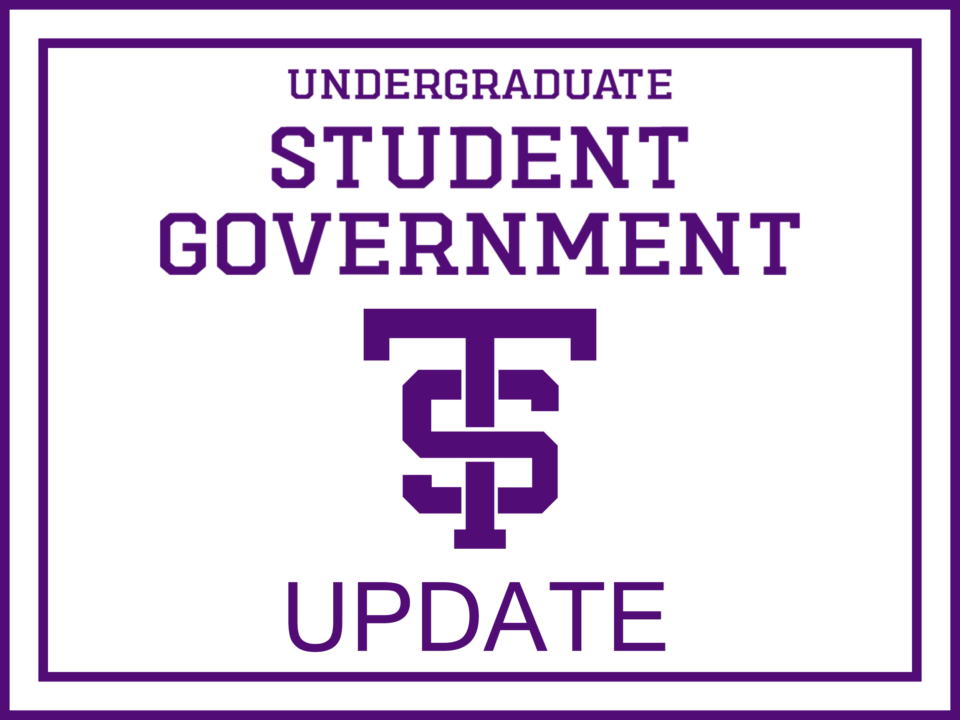
Guest speaker: Katherine Hill
Voter engagement is crucial for improving the community or pushing for change Associate Vice Provost for Faculty Advancement and Research Katherine Hill told USG.
“As a social worker, I take voter engagement really seriously because it’s actually been proven to help people’s physical and mental health improve, if they’re engaged in their communities and voting is engaging,” Hill said.
Hill discussed ways to increase student voting registration and voter turnout through the Civic Engagement, Voter Education and Advocacy taskforce.
In 2018, CEVEA calculated 80% of Tommies were registered to vote but only 61% actually voted.
“This year we are trying to get to 85% registered and 70% voter turnout,” Hill said. “So we’re trying to get those numbers up.”
Hill discussed ways students on campus can help push for voter turnout for the upcoming elections and ones to come.
“We know people are more likely to vote if they know other people who vote in the social activity. There is actual science behind all of that,” Hill said. “It’s been shown it actually improves voter turnout. So talk to the people in your life. Show you’re registered.”
Off-Campus Student Life Representative Alondra Rojas Arenas asked how International students who can’t vote, can help get involved in voter engagement.
“Number one, you can talk to your friends and colleagues about why it matters to vote,” Hill said. “Number two, you certainly could join CEVEA and help us to do all sorts of different outreach activities.”
USG General Council meeting reformatting:
Junior Class President Kate Kapsner presented options for reformatting USG General Council meetings.
“Option one is keeping the meetings as is,” Kapsner said. “We decided that this would be our least likely recommendation.”
USG currently meets every other Thursday, with guest speakers presenting at each meeting. This format has caused an issue of running out of time during their meetings.
Kapsner shared that the discussions during the meetings felt rushed and important issues, topics or questions were left out due to lack of time.
“We feel that we don’t have adequate time to ask questions for speakers a lot of the time because we feel rushed,” Kapsner said. “We don’t feel like we have a lot of general discussion time at the end of our meetings.”
The first reformatting option Kapsner presented is that the general council continues to meet twice a month on Thursdays, but have a guest speaker at one of the meetings.
“The pros that we discussed for this format is having a more focused general forum and more focus on speakers,” Kapsner said. “People aren’t worried about bringing up things that would hold us over time.”
The second reformatting option Kapsner presented is that the general council meets weekly and guest speakers are biweekly.
The presentation outlined the pros and cons for option two. The pros are clubs and finance requests would be approved faster and more time for open forum discussion among the general council. The cons are less attendance due to other activities during convo hour and some meetings not having enough information to discuss.
The reformatting option discussed won’t apply to this semester’s upcoming meetings. USG will vote later in the semester to determine the format for the spring of 2023 general council meetings.
Club approved: Ethiopian-Eritrean Student Alliance
Juniors Dina Fisahaye and Asmert Abraha proposed a new club called Ethiopian-Eritrean Student Alliance for students who are looking for a more specific club to celebrate Ethiopian and Eritrean cultures.
According to Fisahay’s and Abraha’s proposal, “Although there are other clubs out there that represent Africa (ANSA, SSA), Africa being such a rich and diverse continent, it does not fully reflect our backgrounds.”
EESA will meet twice a month on Tuesdays during convo hour and will host discussion of different topics like personal stories or issues affecting Ethiopia and Eritrea today.
“We do plan on planning our meetings around the meetings of ANSA, BESA, and SSA because we understand the importance of supporting our sister clubs,” Abraha said.
Fisahay and Abraha discussed their plans for funding and events the club will host through the year around cultural holidays and non-cultural holidays.
“For funding we plan on using the money for food, decorations, prizes, club shirts and miscellaneous items,” Fisahay said. “Miscellaneous items include things we aren’t sure of a club might need.”
Ethiopian-Eritrean Student Alliance was passed by USG and is expected to start this fall.
Sydney LaBelle can be reached at labe7208@stthomas.edu

